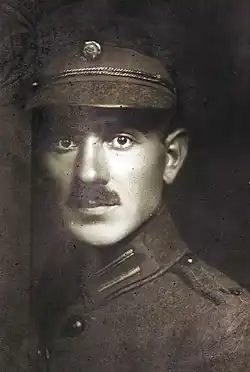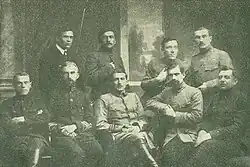Roman Sushko

Roman Souchko (Ukrainian - Рома́н Кирилович Сушко; 1894 – 12 January 1944) was a Ukrainian officer and politician.[1] He was also known by the codenames 'Sytch' and 'Condrat'.
Life
He was born at Remeniv (now in the Lviv Raion of Ukraine, but then in Galicia in the Austro-Hungarian Empire). He served in the Ukrainian fusilier corps within the Austro-Hungarian Army but was captured by the Russians in 1916 and 1917. From 1918 onwards he was one of the organisers of the sharpshooters in the army of the People's Republic of Ukraine, commanding the fusilier division. He took part in the repression of the 1918 Kiev Arsenal January Uprising and helped organise the newly-independent Ukrainian People's Army, especially as part of its staff.

From 1927 to 1930 he served several terms in Polish prisons and in the 1930s emigrated to Vienna. Early in the German and Russian invasions of Poland in 1939 he led the Ukrainian Legion created by Stepan Bandera at Stryi. After the Red Army annexed Galicia the Legion placed itself at the Germans' disposal and took part in no further combat operations.

Late in 1939 he moved to Kraków to head the army of the Ukrainian People's Republic (OUN) in German-occupied Poland and merge the OUN with the National Ukrainian Committee (UCC). He opposed the split between the Bandera and Melynk factions of the OUN in 1940. After Germany invaded the USSR in 1941 he stayed in Lvov, where he was murdered, possibly by Bandera-led partisans[2] or the Gestapo.[1] A street in the Zaliznytsia district of the city is named after him.
References
- ^ a b (in Russian) Сергей Берец. "Украинский легион": помощники нацистов, соперники Бандеры // Би-би-си, 3 сентября 2009 г.
- ^ Звернення ОУН мельниківців «Українці!» (uk)